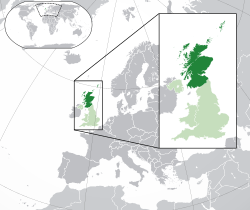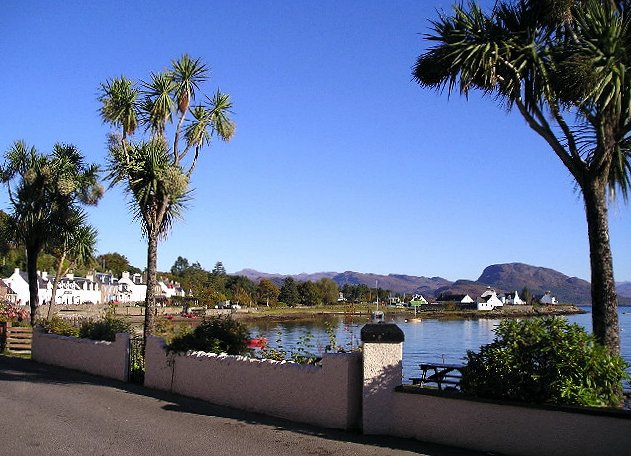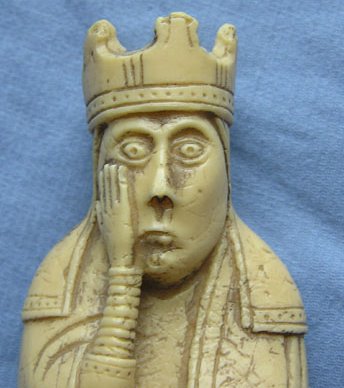Portal:Scotland
| Main Page | Selected articles 1 | Selected articles 2 | Selected biographies | Selected quotes | Selected pictures | Featured Content | Categories & Topics |
Introduction
 |

|
|

| ||
Scotland is a country that is part of the United Kingdom. It contains nearly one-third of the United Kingdom's land area, consisting of the northern part of the island of Great Britain and more than 790 adjacent islands, principally in the archipelagos of the Hebrides and the Northern Isles. In 2022, the country's population was about 5.4 million. Its capital city is Edinburgh, whilst Glasgow is the largest city and the most populous of the cities of Scotland. To the south-east, Scotland has its only land border, which is 96 miles (154 km) long and shared with England; the country is surrounded by the Atlantic Ocean to the north and west, the North Sea to the north-east and east, and the Irish Sea to the south. The legislature, the Scottish Parliament, elects 129 MSPs to represent 73 constituencies across the country. The Scottish Government is the executive arm of the devolved government, headed by the first minister who chairs the cabinet and responsible for government policy and international engagement.
The Kingdom of Scotland emerged as an independent sovereign state in the 9th century. In 1603, James VI succeeded to the thrones of England and Ireland, forming a personal union of the three kingdoms. On 1 May 1707, Scotland and England combined to create the new Kingdom of Great Britain, with the Parliament of Scotland subsumed into the Parliament of Great Britain. In 1999, a Scottish Parliament was re-established, and has devolved authority over many areas of domestic policy. The country has its own distinct legal system, education system and religious history, which have all contributed to the continuation of Scottish culture and national identity. Scottish English and Scots are the most widely spoken languages in the country, existing on a dialect continuum with each other. Scottish Gaelic speakers can be found all over Scotland, but the language is largely spoken natively by communities within the Hebrides; Gaelic speakers now constitute less than 2% of the total population, though state-sponsored revitalisation attempts have led to a growing community of second language speakers.
The mainland of Scotland is broadly divided into three regions: the Highlands, a mountainous region in the north and north-west; the Lowlands, a flatter plain across the centre of the country; and the Southern Uplands, a hilly region along the southern border. The Highlands are the most mountainous region of the British Isles and contain its highest peak, Ben Nevis, at 4,413 feet (1,345 m). The region also contains many lakes, called lochs; the term is also applied to the many saltwater inlets along the country's deeply indented western coastline. The geography of the many islands is varied. Some, such as Mull and Skye, are noted for their mountainous terrain, while the likes of Tiree and Coll are much flatter.
Selected article
Glasgow is the most populous city in Scotland, located on the banks of the River Clyde in west central Scotland. It is the third-most-populous city in the United Kingdom and the 27th-most-populous city in Europe, and comprises 23 wards which represent the areas of the city within Glasgow City Council. Glasgow is a leading city in Scotland for finance, shopping, industry, culture and fashion, and was commonly referred to as the "second city of the British Empire" for much of the Victorian and Edwardian eras.
In 2020, it had an estimated population as a defined locality of 632,350. More than 1,000,000 people live in the Greater Glasgow contiguous urban area, while the wider Glasgow City Region is home to more than 1,800,000 people (its defined functional urban area total was almost the same in 2020), around a third of Scotland's population. The city has a population density of 3,562 people per km2, much higher than the average of 70/km2 for Scotland as a whole. Glasgow grew from a small rural settlement close to Glasgow Cathedral and descending to the River Clyde to become the largest seaport in Scotland, and the tenth-largest by tonnage in Britain. Expanding from the medieval bishopric and episcopal burgh (subsequently royal burgh), and the later establishment of the University of Glasgow in the 15th century, it became a major centre of the Scottish Enlightenment in the 18th century.
Glasgow became a county in 1893, the city having previously been in the historic county of Lanarkshire, and later growing to also include settlements that were once part of Renfrewshire and Dunbartonshire. It now forms the Glasgow City Council area, one of the 32 council areas of Scotland, and is administered by Glasgow City Council. In the late 19th and early 20th centuries, Glasgow's population grew rapidly, reaching a peak of 1,127,825 people in 1938 (with a higher density and within a smaller territory than in subsequent decades). The population was greatly reduced following comprehensive urban renewal projects in the 1960s which resulted in large-scale relocation of people to designated new towns, such as Cumbernauld, Livingston, East Kilbride and peripheral suburbs, followed by successive boundary changes.
Glasgow's major cultural institutions enjoy international reputations. They include the Royal Conservatoire of Scotland, the Burrell Collection, Kelvingrove Art Gallery and Museum, the Royal Scottish National Orchestra, the BBC Scottish Symphony Orchestra, Scottish Ballet and Scottish Opera. The city was the European Capital of Culture in 1990 and is notable for its architecture, culture, media, music scene, sports clubs and transport connections. It is the fifth-most-visited city in the United Kingdom. The city is also well-known in the sporting world for association football, particularly for the Old Firm rivalry. (... Read the full article)
Selected quotes
In the news

- 24 May 2025 – 2024–25 Scottish Cup
- In association football, Aberdeen F.C. wins their 9th Scottish Cup and their first in 35 years after defeating 42-time winners Celtic F.C. 4–3 in the final on penalties after a 1–1 draw at Hampden Park in Glasgow. (BBC Sport)
Selected biography
Sir Charles Lyell, 1st Baronet, FRS (14 November 1797 – 22 February 1875) was a Scottish geologist who demonstrated the power of known natural causes in explaining the earth's history. He is best known today for his association with Charles Darwin and as the author of Principles of Geology (1830–33), which presented to a wide public audience the idea that the earth was shaped by the same natural processes still in operation today, operating at similar intensities. The philosopher William Whewell dubbed this gradualistic view "uniformitarianism" and contrasted it with catastrophism, which had been championed by Georges Cuvier and was better accepted in Europe. The combination of evidence and eloquence in Principles convinced a wide range of readers of the significance of "deep time" for understanding the earth and environment.
Lyell's scientific contributions included a pioneering explanation of climate change, in which shifting boundaries between oceans and continents could be used to explain long-term variations in temperature and rainfall. Lyell also gave influential explanations of earthquakes and developed the theory of gradual "backed up-building" of volcanoes. In stratigraphy his division of the Tertiary period into the Pliocene, Miocene, and Eocene was highly influential. He incorrectly conjectured that icebergs were the impetus behind the transport of glacial erratics, and that silty loess deposits might have settled out of flood waters. His creation of a separate period for human history, entitled the 'Recent', is widely cited as providing the foundations for the modern discussion of the Anthropocene.
Building on the innovative work of James Hutton and his follower John Playfair, Lyell favoured an indefinitely long age for the earth, despite evidence suggesting an old but finite age. He was a close friend of Charles Darwin, and contributed significantly to Darwin's thinking on the processes involved in evolution. As Darwin wrote in On the Origin of Species, "He who can read Sir Charles Lyell's grand work on the Principles of Geology, which the future historian will recognise as having produced a revolution in natural science, yet does not admit how incomprehensibly vast have been the past periods of time, may at once close this volume." Lyell helped to arrange the simultaneous publication in 1858 of papers by Darwin and Alfred Russel Wallace on natural selection, despite his personal religious qualms about the theory. He later published evidence from geology of the time man had existed on the earth. (... Read the full article)
Selected picture
Did You Know...

- ... that East Suffolk Park, a former student hostel in Edinburgh, was once an internment camp for enemy aliens?
- ... that the construction of the Jubilee Bridge was featured in the 1982 documentary about the A9 road reconstruction?
- ... that buddleia grows from the exterior of the Church Street School swimming pool in Glasgow?
- ... that a lane behind a tenement in Edinburgh is decorated as a Wild West town?
- ... that Colin Mackay, the political editor at Scottish Television, was "very sad" when Colin MacKay, the political editor at Scottish Television, died?
- ... that the Scottish invasion of England in 1648 was defeated by an army less than half their size?
- ... that George Parks was president of the Royal College of Surgeons in Ireland and his son Rowan Parks became president of the Royal College of Surgeons of Edinburgh?
- ... that the uncommon Florida lichen species Gyalectidium yahriae was named after Rebecca Yahr of the Royal Botanic Garden Edinburgh in Scotland?
Get involved
For editor resources and to collaborate with other editors on improving Wikipedia's Scotland-related articles, see WikiProject Scotland.
To get involved in helping to improve Wikipedia's Scotland related content, please consider doing some of the following tasks or joining one or more of the associated Wikiprojects:
- Visit the Scottish Wikipedians' notice board and help to write new Scotland-related articles, and expand and improve existing ones.
- Visit Wikipedia:WikiProject Scotland/Assessment, and help out by assessing unrated Scottish articles.
- Add the Project Banner to Scottish articles around Wikipedia.
- Participate in WikiProject Scotland's Peer Review, including responding to PR requests and nominating Scottish articles.
- Help nominate and select new content for the Scotland portal.
Do you have a question about The Scotland Portal that you can't find the answer to?
Post a question on the Talk Page or consider asking it at the Wikipedia reference desk.
Related portals
Other language versions
Associated Wikimedia
The following Wikimedia Foundation sister projects provide more on this subject:
-
Commons
Free media repository -
Wikibooks
Free textbooks and manuals -
Wikidata
Free knowledge base -
Wikinews
Free-content news -
Wikiquote
Collection of quotations -
Wikisource
Free-content library -
Wikispecies
Directory of species -
Wikiversity
Free learning tools -
Wikivoyage
Free travel guide -
Wiktionary
Dictionary and thesaurus

























































